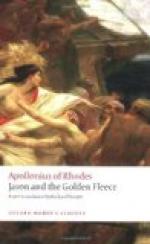“I go, leaving this long tress here in my stead, O mother mine; take this farewell from me as I go far hence; farewell Chalciope, and all my home. Would that the sea, stranger, had dashed thee to pieces, ere thou earnest to the Colchian land!”
Thus she spake, and from her eyes shed copious tears. And as a bondmaid steals away from a wealthy house, whom fate has lately severed from her native land, nor yet has she made trial of grievous toil, but still unschooled to misery and shrinking in terror from slavish tasks, goes about beneath the cruel hands of a mistress; even so the lovely maiden rushed forth from her home. But to her the bolts of the doors gave way self-moved, leaping backwards at the swift strains of her magic song. And with bare feet she sped along the narrow paths, with her left hand holding her robe over her brow to veil her face and fair cheeks, and with her right lifting up the hem of her tunic. Quickly along the dark track, outside the towers of the spacious city, did she come in fear; nor did any of the warders note her, but she sped on unseen by them. Thence she was minded to go to the temple; for well she knew the way, having often aforetime wandered there in quest of corpses and noxious roots of the earth, as a sorceress is wont to do; and her soul fluttered with quivering fear. And the Titanian goddess, the moon, rising from a far land, beheld her as she fled distraught, and fiercely exulted over her, and thus spake to her own heart:
“Not I alone then stray to the Latmian cave, nor do I alone burn with love for fair Endymion; oft times with thoughts of love have I been driven away by thy crafty spells, in order that in the darkness of night thou mightest work thy sorcery at ease, even the deeds dear to thee. And now thou thyself too hast part in a like mad passion; and some god of affliction has given thee Jason to be thy grievous woe. Well, go on, and steel thy heart, wise though thou be, to take up thy burden of pain, fraught with many sighs.”
“Thus spake the goddess; but swiftly the maiden’s feet bore her, hasting on. And gladly did she gain the high bank of the river and beheld on the opposite side the gleam of fire, which all night long the heroes were kindling in joy at the contest’s issue. Then through the gloom, with clear-pealing voice from across the stream, she called on Phrontis, the youngest of Phrixus’ sons, and he with his brothers and Aeson’s son recognised the maiden’s




